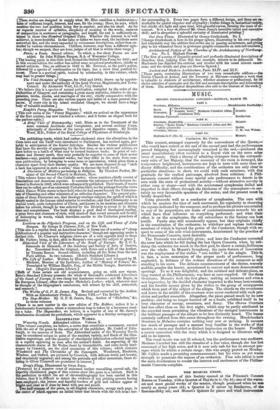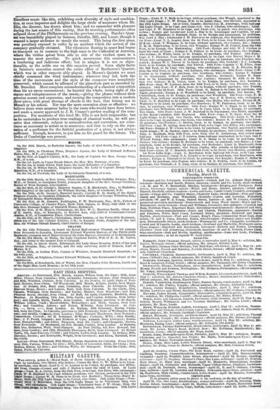THE MUSICAL UNION.
The second season of this Society opened at the Princess's Concert Rooms on Tuesday, with a Quartet of Haydn in G. Op. 81; one of the warm- est and most genial works of the master, though produced when he was nearly as many years old; a Quartet in E minor by Beethoven, of the Rasoumoffsky set; and Mozart's Quintet for piano and wind instruments Eicellent music like this, exhibiting such diversity of style and combina- tion, at once improves and delights the large circle of amateurs whom Mr. Ella, the director, has drawn about him; and we remember with pleasure during the last season of this society, that its morning performances often eclipsed those of the Philharmonic on the previous evening. Haydn's Quar- tet was beautifully played by Sainton, Deloffre, Hill, and Lucas; though it wanted a larger audience to steady the sound. This being the first piece, was pecnliary exposed to suffer by an accident which the arrival of the company gradually obviated. The vibrations floating in space had begun to transport us in memory to the high mass in the Cathedral at Antwerp, where the violins splash from side to side of the vaulted space in a manner the most peculiar. To quick movements this communicates a lumbering and ludicrous effect; but in adagios it is not so objec- tionable, as the noble one on this occasion proved. Some slight faults in Sainton's execution marred the entire effect of Beethoven's Quartet; which was in other respects ably played. In Mozart's Quintet we must chiefly commend the wind instruments; wherever they led, both the time of the movements and the style of the composer were completely preserved; which cannot be affirmed of the pianoforte part as executed by Mr. Benedict. More complete misunderstanding of a classical composition than his we never encountered: he hurried the whole, losing sight of the repose and voluptuousness of the music,-giving the phases without their genuine accent and expression, and turning the composition into a modern chow-piece, with great thumps of chords in the bass, that belong not to Mozart or his school. Nor was the mere execution clear or effective: we believe there were amateur ladies in the room who would have done better, and made a nearer approach to J. B. Cramer's perfect reading of the com- position. For accidents of this kind Mr. Ella is not held responsible: but as he undertakes to produce true readings of classical works, he will per- ceive that rehearsals, subject to animadversion and correction, are some- times as necessary to artists as to amateurs; and that to rely on the repu- tation of a performer for the faithful production of a piece, is not always sufficient. Enough, however, to put him on his guard for the future. The Duke of Cambridge was present.



























 Previous page
Previous page